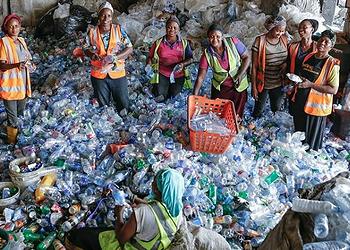
SANTIAGO, Chile, September 9, 2022 (ENS) – To keep plastic trash out of the ocean and off Chile’s 4,000 mile coastline, a new single-use plastics law in the country requires supermarkets to provide customers with returnable beverage bottle options both in stores and online.
Now Oceana, a nonprofit ocean conservation organization based in Washington, DC, is holding Chile’s two largest supermarket chains to the letter of the new Chilean law.
Oceana filed a lawsuit late last month against “hypermarket” chains Jumbo and Líder for failing to provide consumers with refillable beverage bottle options on their online platforms, now required by Chile’s new law.
The lawsuit, filed with the Local Police Court of Providencia, comes after an Oceana investigation found that Jumbo Hypermarkets, a chain of stores operating in Chile, Argentina and in Colombia, and the competing Chilean hypermarket chain Líder, owned by Walmart, fail to provide consumers with refillable beverage bottle options online.
“It’s imperative for companies to comply with this new regulation to reduce disposable products and increase the use of refillable bottles,” said Javiera Calisto, Oceana’s legal director in Chile. “We’re calling on large supermarket chains to comply with this new law and offer consumers refillable bottle options on their online platforms.”
“Sixty-three percent of Chileans make their purchases online, so holding retailers accountable is more important than ever,” she explained.
The new law originated after Oceana and Plastic Oceans Chile released a study that revealed Chilean restaurants, bars, cafes, and delivery food companies use over 23,000 tons of single-use plastics every year.
Signed into law in August 2021 and officially in effect since February 2022, Chile’s new single-use plastics law specifies that all supermarkets with more than three checkout points must offer and receive refillable beverage bottles in their physical locations, as well as on their online platforms. Failure to do so will result in a fine between US$67 and $1,330 for each day the retailer is noncompliant.
“Refillable bottles create less plastic waste, have a lower carbon footprint, and save consumers money,” said Calisto. “This is why it’s essential for supermarkets to make refillable bottles available to consumers on their online platforms.”
Oceana says refillable plastic bottles can be reused about 15 to 20 times, while glass bottles can be used more than 30 times.
The reuse culture is already popular in Chile. In fact, Chile’s use of refillable bottles accounts for 37 percent of the market in Latin America, a figure that is likely to increase once this new law is fully enforced because it will require all supermarkets, grocery stores, and convenience stores to have at least 30 percent of their beverages offered in refillable bottles.
In addition to the refillable bottle requirements, the law prohibits all food establishments from providing plastic tableware including cutlery, straws, and plastic foam foodware. It also requires delivery and take-out facilities to only provide disposable tableware made from materials other than plastic or made of certified plastic.
In 2024, the law will ban the provision of disposable products made of any material for consumption inside food establishments – restaurants, coffee shops, ice cream parlors – while all plastics for takeout or delivery will be banned, except for certain products that will have to be made of plastic that is certified by the Ministry of Environment. These regulations will also be enforced in government facilities.
Featured image: A Jumbo hypermarket in Santiago, Chile (Photo courtesy The Culture Trip)
Environment News Service (ENS) © 2022 All Rights Reserved.



